2010-2011初三上学期英语期末复习——非谓语动词1word下载
九年级英语中的非谓语动词

九年级英语中的非谓语动词一、选择题1.—I don’t know _____ remember the new English words.—Don’t worry! Try thinking about their pronunciations.A.what to B.how to C.where to D.when to 2.—Why do you speak in _________ a loud voice?—Because I want to make myself ________ clearly.A.such; hear B.so; heard C.such; heard D.so; hear3.---Why hasn’t the doctor stopped ________ lunch?---Because he is too busy ________ a dying patient in the operation room.A.to have; to save B.to have; saving C.having; saving D.having; to save 4.There are no ways she can come up ________ herself out.A.with to help B.to help C.with helping D.to helping5.Our teacher always chooses classical songs she enjoys ________ us between classes. A.relax B.relaxing C.to relax D.to relaxing 6.—Why do the students need to read every day?—________information for writing.A.To collect B.Collecting C.Collect D.Collected 7.Online short video apps like Douyin make________easier to do some shopping at home. A.it B.one C.this D.that8.— I decide ___________ hard on my English.—You need to speak as much as possible.A.working B.worked C.to work D.work9.—I feel stressed at times, but I don’t know________about it.—You can come to me whenever you need.A.whom to talk B.when to talk C.who to talk to D.when to talk to 10.—I didn’t hear you come in just now.—That’s great. I tried ________ the baby up.A.no waking B.don’t wake C.to not wake D.not to wake 11.﹣I have a package ,but I'm too busy.﹣Why not have your cousin it for you?A.to send; send B.sent; sendC.to send; to send D.sent; to send12.Scientists should do something they can ____ this kind of virus from spreading into a wider area.A.prevent B.to prevent C.preventing D.prevented 13.The price of housing in Nanjing is so high that many people can’t afford ________ a flat. A.buying B.to buy C.bought D.buy14.I don’t like sad movies because it usually makes me ________A.crying B.cries C.to cry D.cry15.She couldn’t wait ________ her mother the good news.A.to tell B.telling C.to talk D.talking 16.When I eat a mooncake, I prefer ________ it into small pieces before eating rather than ________ it up straight.A.to cut;eat B.cutting;eat C.to cut;to eat D.cutting;eating 17.Our parents won't allow us _____ in the river alone.A.swimB.to swimC.swimmingD.swam18.(2017届山东省滨州市滨城区九年级第二次模拟)David enjoys ____ music at weekends, but I prefer ________ for a picnic.A.listening to;go out B.listening to;to go outC.to listen to;to go out D.listen to;going out19.—To keep the students safe on their way to school, we have taken more action.— That sounds great. We should do what we can __________ the school bus accident.A.to prevent B.prevent C.to preventing D.preventing 20.When you are home, give a call ___________ me know you have arrived safely.A.let B.to let C.letting D.be let 21.—We set World Reading Day ________ teens to form a good reading habit.—Nowadays, people are more aware of the importance of reading.A.to encourage B.encouraging C.encouraged D.encourage 22.________ ill, I can’t go to school today.A.Because of B.As C.Being D.With 23.There ______ a group of people _______on the beach.A.is, lying B.are, lying C.have, laid D.has,lie 24.He tried to make himself ________ by his students, but he failed.A.understand B.understoodC.understands D.understanding25.—There is something wrong with your bike,isn’t there?—Yes. I’ll have it tomorrow.A.repair B.repairingC.repaired D.to repair26.She left the lights on overnight and in the morning she couldn’t get the car ________. A.to start B.starting C.started D.starts 27.After World War II, Anne’s father collected her diary and had it ___________ in 1947. A.publish B.to publish C.published D.been published 28.Mrs. White showed her student some old maps ________from the library.A.to borrow B.to be borrowed C.borrowed D.borrowing29.Mr. Smith is much surprised to find the watch he has had ________ is nowhere to be seen. A.to repair it B.it repaired C.repaired D.to be repaired30.I still like the good old songs I often listen to myself in my spare time.A.enjoy B.enjoying C.to enjoy D.enjoyed 31.When you travel abroad, you can hardly avoid products made in China.A.to buy B.buy C.buying D.be bought 32.Seeing their teacher _______ into the classroom, they stopped _______ at once.A.walk; telling B.entering; to speak C.enter; to tell D.walking; talking 33.Mr. Grea found Tom a novel in class when he came in.A.is reading B.reading C.read D.to read34.-I tried to make Alice ___________ her mind but I found it difficult.-Well, I saw you __________that when I went past.A.changed; do B.changes; doing C.change; to do D.change; doing 35.When I walked past the park, I saw some old people _________ Chinese Taiji.A.do B.doing C.did D.are doing 36.—What are you talking about?—Some pictures ________ yesterday.A.were taken B.took C.taken D.have been taken 37.Children are not born with their habits already _______.A.to make B.to be made C.making D.made38.The rubbish ________ every day is becoming a serious problem in cities around the world. A.produce B.produced C.producer D.producing39.If you want to make yourself ______, you should speak clearly and slowly.A.to understand B.understood C.understand D.understanding 40.I would rather spend time ______ at home than ______ out with you.A.staying; go B.to stay; to go C.staying; to go D.to stay; go41.Nowadays students have more time to practice ________ English after class.A.speak B.spoke C.speaking D.to speak 42.—Doctor! I can’t fall at night.—Don’t worry! You are too stresse d. Just be relaxed and take some pills, then you’ll be better. A.sleepy; asleep B.asleep; sleepingC.sleep; sleep D.asleep, sleepy43.—Is there anything amazing in today’s newspaper?—Yes. By using ordinary computers, NASA scientists are busy________ at home to control a space rover(天体登陆车)on the Red Planet. .A.to programme B.programming C.programme D.with programming 44.—Would you please show me how ______ the App “My Yancheng”?—No problem.A.use B.to use C.using D.used45.Huawei has succeeded in ________new software for his products. I can’t wait ________anew Huawei mobile.A.developing, to buy B.developed, buying C.developing, buy D.develop, buying 46.When I was young I liked to listen to the radio, ________ for my favourite song.A.wait B.waited C.waiting D.so that wait47.I hope everyone can care about ______ the environment and stop ______ things. A.protecting; wasting B.protecting; to wasteC.protect; wasting D.protect; to waste48.—You don’t know what great difficulty I had ________ to get th e two tickets.—But the film is really worth _________ twice.A.managing; seeing B.to manage; seeingC.managing; being seen D.managed; to see49.________ of the road ________ broken down. It needs ________.A.Three-fourths; was; repairedB.Three quarters; has; to repairC.Three-fourth; was; to be repairedD.Three quarters; has; repairing50.—What’s your plan for the coming summer holiday?—I’ll devote as much time as I can some voluntary work.A.to do B.to doing C.do D.doing51.He made up his mind to devote his life________ pollution ________happily.A.to prevent; from living B.to prevent; to liveC.to preventing; from living D.to preventing; to live52.We should encourage our students _____ hard instead of ____ too much time playing games. A.work; spend B.to work; spendC.work; spending D.to work; spending53.— It is kind the doctors to devote all the time he had to for the patients.— I think so, they are so great.A.for, care B.of, care C.of, caring D.for caring54.— Jack, why have you decided ________ Chinese folk music as a course.— To learn more about Chinese culture.A.take B.taken C.to take D.taking 55.There’s no difference between the two words. So I can’t decide ________.A.what to choose B.which to choose C.to choose which D.to choose what 56.People who run towards their dreams prefer _______ the failure rather than _______ their dream.A.experiencing; to give up B.to experience; give up C.experiencing; giving up D.to experience; to give up57.Who are you going to have ________ the library since the designer is busy these days. A.to design B.designed C.designing D.design58.The workers are made ________ ten hours a day.A.work B.to work C.working D.worked59.The computer requires ________. I think I need ________ to ask Mr. Zhang for help. A.fixing, to go B.to fix, going C.fixing, going D.to fix, to go 60.—I prefer ________ with a pen to ________ on the computer, because I type so slowly. —So do I.A.write; typing B.to write; to type C.writing; to type D.writing; typing 【参考答案】一、选择题1.B解析:B【详解】句意:——我不知道如何记住新的英语单词。
英语中考英语 非谓语动词期末复习专题练习(word版 ... (2)
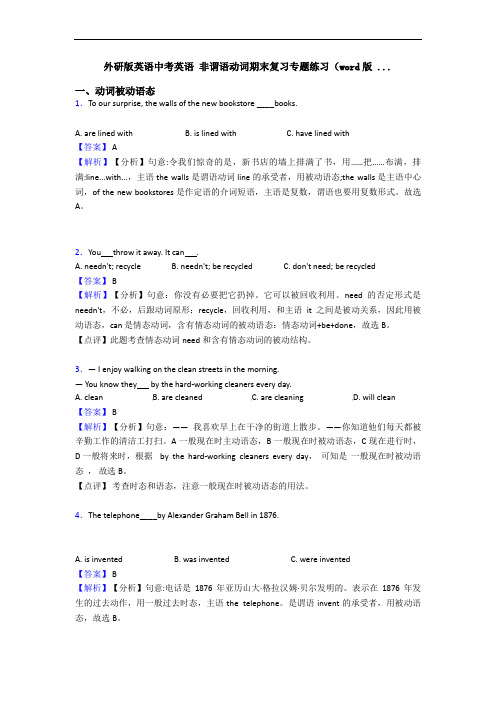
外研版英语中考英语非谓语动词期末复习专题练习(word版 ...一、动词被动语态1.To our surprise, the walls of the new bookstore ____books.A. are lined withB. is lined withC. have lined with【答案】 A【解析】【分析】句意:令我们惊奇的是,新书店的墙上排满了书,用……把……布满,排满:line...with...,主语the walls是谓语动词line的承受者,用被动语态;the walls是主语中心词,of the new bookstores是作定语的介词短语,主语是复数,谓语也要用复数形式。
故选A。
2.You throw it away. It can .A. needn't; recycleB. needn't; be recycledC. don't need; be recycled【答案】 B【解析】【分析】句意:你没有必要把它扔掉。
它可以被回收利用。
need的否定形式是needn't,不必,后跟动词原形;recycle,回收利用,和主语it之间是被动关系,因此用被动语态,can 是情态动词,含有情态动词的被动语态:情态动词+be+done,故选B。
【点评】此题考查情态动词need和含有情态动词的被动结构。
3.— I enjoy walking on the clean streets in the morning.— You know they by the hard-working cleaners every day.A. cleanB. are cleanedC. are cleaningD. will clean【答案】 B【解析】【分析】句意:——我喜欢早上在干净的街道上散步。
——你知道他们每天都被辛勤工作的清洁工打扫。
A一般现在时主动语态,B一般现在时被动语态,C现在进行时,D一般将来时,根据by the hard-working cleaners every day,可知是一般现在时被动语态,故选B。
中考英语复习:非谓语动词

中考英语复习:非谓语动词1非谓语动词基本形式动词:He asks me to help him often.谓语非谓语1.谓语动词:时态/被动语态2.非谓语:do/ to do/ doing/ done2非谓语动词的判定非谓语动词一直是英语学习的难点,也是中考的常考点,主要为动词不定式和动名词,在单项填空、词形填空和词组翻译题型中均有涉及。
学生在做此类试题时应先分析本题该用谓语动词还是非谓语动词,然后才能确定选用动词的哪种形式或者非谓语的哪种形式。
如何确定使用动词的哪种形式具体讲解详见动词的时态,下面列举几种常见的判定非谓语动词形式的方法:1.如何判定本题该使用谓语动词还是非谓语动词:判断句子是否缺少谓语。
①当句子缺少谓语时,该动词就用谓语动词形式。
一般情况下,动词作谓语放在主语之后,如“I love you.”中,love就是谓语动词。
②当句中已有谓语动词又没有并列连词与所填动词并列时,该动词就用非谓语动词形式。
非谓语动词可以在句子中作除谓语以外的任何成分,如主语、宾语、宾语补足语、表语、定语、状语及插入语。
3非谓语动词的分类(不定式,动名词)1)不定式1.不定式的构成不定式的基本形式为:to+动词原形,有时可以不用to,这里的to是不定式符号,本身无词义,动词不定式的否定形式是not+to+动词原形。
动词不定式没有人称动词不定式的特殊句型:①too…to… “太……而不能……”。
如:The boy is too young to look after himself. 那个男孩太小而不能照顾自己。
②…enough to…“……足够……”。
如:He is old enough to go to school. 他足够大能去上学了。
③Why don’t you +省略to的不定式?=Why not +省略to的不定式?为什么不……呢?如:Why don't you get her a photo album? =Why not get her a photo album? 为什么不给她买个相册呢?④had better+(not)+省略to的不定式。
初三英语专题复习(非谓语动词)
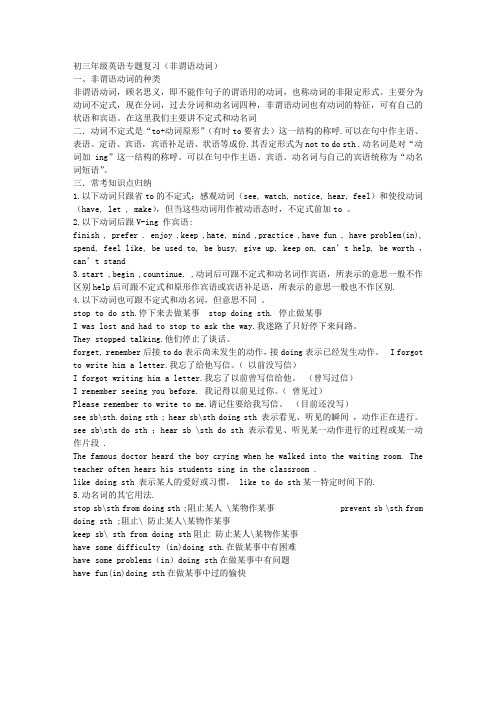
初三年级英语专题复习(非谓语动词)一、非谓语动词的种类非谓语动词,顾名思义,即不能作句子的谓语用的动词,也称动词的非限定形式。
主要分为动词不定式,现在分词,过去分词和动名词四种,非谓语动词也有动词的特征,可有自己的状语和宾语。
在这里我们主要讲不定式和动名词二.动词不定式是“to+动词原形”(有时to要省去)这一结构的称呼.可以在句中作主语、表语、定语、宾语,宾语补足语、状语等成份.其否定形式为not to do sth .动名词是对“动词加ing”这一结构的称呼。
可以在句中作主语、宾语。
动名词与自己的宾语统称为“动名词短语”。
三.常考知识点归纳1.以下动词只跟省to的不定式:感观动词(see, watch, notice, hear, feel)和使役动词(have, let , make),但当这些动词用作被动语态时,不定式前加to 。
2.以下动词后跟V-ing 作宾语:finish , prefer . enjoy ,keep ,hate, mind ,practice ,have fun , have problem(in), spend, feel like, be used to, be busy, give up, keep on, can’t help, be worth ,can’t stand3.start ,begin ,countinue. ,动词后可跟不定式和动名词作宾语,所表示的意思一般不作区别help后可跟不定式和原形作宾语或宾语补足语,所表示的意思一般也不作区别.4.以下动词也可跟不定式和动名词,但意思不同。
stop to do sth.停下来去做某事 stop doing sth. 停止做某事I was lost and had to stop to ask the way.我迷路了只好停下来问路。
They stopped talking.他们停止了谈话。
forget, remember后接to do表示尚未发生的动作,接doing表示已经发生动作。
初三-非谓语动词专题(DOC)
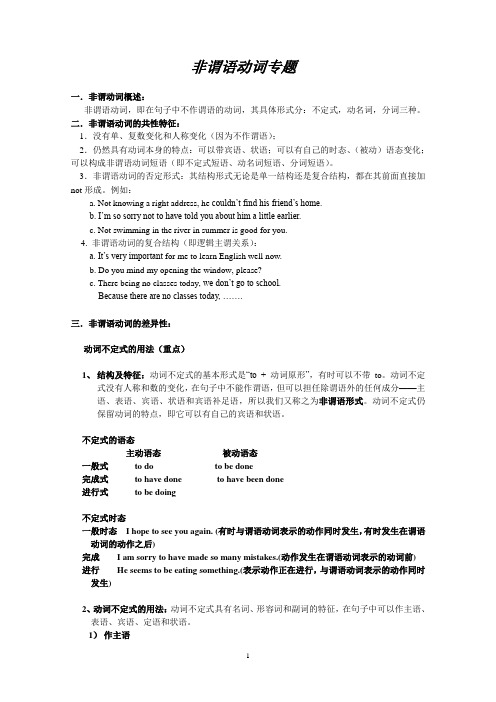
非谓语动词专题一.非谓动词概述:非谓语动词,即在句子中不作谓语的动词,其具体形式分:不定式,动名词,分词三种。
二.非谓语动词的共性特征:1.没有单、复数变化和人称变化(因为不作谓语);2.仍然具有动词本身的特点:可以带宾语、状语;可以有自己的时态、(被动)语态变化;可以构成非谓语动词短语(即不定式短语、动名词短语、分词短语)。
3.非谓语动词的否定形式:其结构形式无论是单一结构还是复合结构,都在其前面直接加not形成。
例如:a. Not knowing a right address, he couldn’t find his friend’s home.b. I’m so sorry not to have told you about him a little earlier.c. Not swimming in the river in summer is good for you.4. 非谓语动词的复合结构(即逻辑主谓关系):a. It’s very important for me to learn English well now.b. Do you mind my opening the window, please?c. There being no classes today, we don’t go to school.Because there are no classes today, …….三.非谓语动词的差异性:动词不定式的用法(重点)1、结构及特征:动词不定式的基本形式是“to + 动词原形”,有时可以不带to。
动词不定式没有人称和数的变化,在句子中不能作谓语,但可以担任除谓语外的任何成分——主语、表语、宾语、状语和宾语补足语,所以我们又称之为非谓语形式。
动词不定式仍保留动词的特点,即它可以有自己的宾语和状语。
不定式的语态主动语态被动语态一般式to do to be done完成式to have done to have been done进行式to be doing不定式时态一般时态I hope to see you again. (有时与谓语动词表示的动作同时发生,有时发生在谓语动词的动作之后)完成I am sorry to have made so many mistakes.(动作发生在谓语动词表示的动词前) 进行He seems to be eating something.(表示动作正在进行,与谓语动词表示的动作同时发生)2、动词不定式的用法:动词不定式具有名词、形容词和副词的特征,在句子中可以作主语、表语、宾语、定语和状语。
初三系列复习资料 非谓语动词

初三系列复习资料(3)动词考点集汇、讲解和训练43.非谓语动词对非谓语动词的考点是:感官动词后不定式作宾语补足语和动词ing形式作宾语补足语的用法;一些特殊动词的动词不定式作宾语补足语时不带to,但变为被动语态时就要带to;有些动词既可接不定式也可接动词ing形式作宾语,但表达的意思不同。
这些都是历年中考的重点。
(1)非谓语动词的形式非谓语动词指的是在句中起名词,形容词或副词作用的动词形式,而不是作谓语的动词形式。
动词的非谓语形式分为动名词,分词,动词不定式。
(2)不定式作宾语补足语Father will not allow us to play on the street.(3)不定式作目的状语He ran so fast as to catch the first bus.(4)用不定式和分词作补足语都可以的动词这样的动词有感官动词如:see, hear, look, notice, observe, feel等,使役动词如:have, make, leave, keep, get等。
接不定式表示动作的完整性,真实性;+doing 表示动作的连续性,进行性。
I saw him work in the garden yesterday.昨天我看见他在花园里干活了。
(强调"我看见了"这个事实)I saw him working in the garden yesterday.(强调"我见他正干活"这个动作)昨天我见他正在花园里干活。
(5)用不带to不定式的情况使役动词如:let, have, make等和感官动词如:see, watch, hear, listen to, smell, feel, find 等后作宾补,省略to。
在被动语态中则to不能省掉。
(6)接动名词与不定式意义不同1) stop to do停止,中断做某事后去做另一件事。
stop doing停止做某事。
九年级英语语法专项复习——非谓语动词(含答案)

Name Group Class语法专项复习——非谓语动词【Get ready before class】知识点总结:在句子动词的基本用法是作谓语。
当句中已经有了谓语动词了,要选或要填的动词就只能用非谓语形式了。
非谓语形式有三种:1. 动词不定式:to do2. 动词的ing:doing3. 动词的过去分词:done。
否定形式:在非谓语动词前加not, never, 即not / never to do, not / never doing一、非谓语动词的做题步骤1. 判定是否用非谓语形式。
方法:看看句子中是否已有了谓语动词了。
2. 找非谓语动词的逻辑主语。
方法:非谓语动词的逻辑主语一般是句子的主语。
3. 判断主被动关系。
方法:非谓语动词与其逻辑主语是主动还是被动关系。
4. 判断时间关系。
方法:分析句子,看看非谓语动词所表示的动作发生在谓语动作之前、之后还是同时。
之前常用done; 之后常用to do; 同时常用doing。
二、常见搭配Doing sth.1 完成某事情finish doing sth.2 喜欢做某事like / enjoy doing sth.3 讨厌做某事hate doing sth.4 去游泳/ 远足go swimming / hiking5 购物/看书do some shopping/reading6 买票划船buy tickets for boating7 掰完玉米后after picking corns8 擅长做某事be good at doing sth.9 做某事遇了些问题have some problems (in) doing sth.10 获得乐趣have fun doing sth.11 忙于干某事be busy doing sth.12 感谢您做某事thank you for doing sth.13 做某事怎样?What /How about doing sth.?14 跑步有益健康。
九年级英语语法专项复习——非谓语动词(含答案)

Name Group Class语法专项复习——非谓语动词【Get ready before class】知识点总结:在句子动词的基本用法是作谓语。
当句中已经有了谓语动词了,要选或要填的动词就只能用非谓语形式了。
非谓语形式有三种:1. 动词不定式:to do2. 动词的ing:doing3. 动词的过去分词:done。
否定形式:在非谓语动词前加not, never, 即not / never to do, not / never doing一、非谓语动词的做题步骤1. 判定是否用非谓语形式。
方法:看看句子中是否已有了谓语动词了。
2. 找非谓语动词的逻辑主语。
方法:非谓语动词的逻辑主语一般是句子的主语。
3. 判断主被动关系。
方法:非谓语动词与其逻辑主语是主动还是被动关系。
4. 判断时间关系。
方法:分析句子,看看非谓语动词所表示的动作发生在谓语动作之前、之后还是同时。
之前常用done; 之后常用to do; 同时常用doing。
二、常见搭配Doing sth.1 完成某事情finish doing sth.2 喜欢做某事like / enjoy doing sth.3 讨厌做某事hate doing sth.4 去游泳/ 远足go swimming / hiking5 购物/看书do some shopping/reading6 买票划船buy tickets for boating7 掰完玉米后after picking corns8 擅长做某事be good at doing sth.9 做某事遇了些问题have some problems (in) doing sth.10 获得乐趣have fun doing sth.11 忙于干某事be busy doing sth.12 感谢您做某事thank you for doing sth.13 做某事怎样?What /How about doing sth.?14 跑步有益健康。
(完整word版)中考英语中考非谓语动词专题知识点复习(良心出品必属精品)

中考英语中考非谓语动词专题知识点复习中考英语非谓语动词专练1.The students are ept bus their lessnsA.t revie B.revie .revieing D.n revieing2.I nsider t see the fil next SundaA.t g B.g .t be ging D.ging3.I uldn’t advise there b bus, beause it is t rded A.g B.t g .t ging D.ging4.I advised at neA.hi t starting B.hi t start .t starting D.t start 5.e dn’t all in this rA.sing B.t se.peple sing D.peple t sing6.u shuldn’t all gaes near the lassr fr it’s t nis A.student plaing B.t pla .students t pla D.t plaing 7.The are bus fr the exaA.t prepare B.preparing .prepared D.t preparing 8.e shuld eep n English ever daA.t pratise t spea B.t pratise speaing.pratising t spea D.pratising speaing9.I’ srr t have ept uA.ait B.t ait .aited D.aiting10.It’s dangerus t let the hildren h are g siing in the river A.s ung t B.nt ld enugh t .s ung D.t ung t11.The prie f fd ept in thse dasA.ging B.getting .rising D.turning12.The travelers std n the hillside and led at the sun A.risen B.raise .rising D.raising13.The ther as ased TV ever eveningA.nt t let her hildren ath B.nt t let her hildren t ath .nt let her hildren ath D.nt let her hildren athing 14.The dtr ased hi nt t leave his undA.expsed B.t expse .t be expsed D.expsing1.He lies , but he desn’t lie tda beause it is t ldA.t si; t si B.siing; siing.t si; siing D.siing; t si16.He sat t her the stairsA.t listen; t lib B.listening; t lib.listening; lib D.listening; t libing17.He uld sit alne and listen t a the pianA.t pla B.plaing .plaed D.t plaing18.The girl as ade she didn’t lve at allA.arr a an B.t arr a an.t arr ith a an D.arried ith a an19.Dn’t ae hi it if he desn’t ant tA.d B.t d .ding D.that he d20.This experiene ade hi the stud f sieneA.interest in B.t interest in .interesting in D.interested in21.He raised his vie s as t ae hiselfA.hear B.hearing .be heard D.heard22.He anaged t ae hiself ith his EnglishA.understand; breaing B.understand; bren.understd; breaing D.understd; bren23.It’s tie t listen t the nes uld u ind the radi?A.e t pen B. t pen . pening D. turning n24.I dn’t ind t the partA.being nt invited B.nt inviting .nt being invited D.nt t be invited2.The b didn’t ind alne at heA.t leave B.leaving .t be left D.being left26.“D u ind ?” “G ahead”A.turning n the fan B.if I turn n the fan.t turn n the fan D.I turn n the fan27.e didn’t iss the ftball ath last nightA.athing B.t ath .ath D.athed28.I’ srr, but I ust sa ur English needsA.iprving B.t be iprving .iprve D.an iprveent29.She ust be ling frard as uh t his return as he hiself is t herA.see B.have seen .seeing D.having seen30.“u have e ust in tie t help us”“Fine, hat needs ?”A.I d B.dne .t be dne D.t d31.In England as earl as the entur, ung peple ened ftball A.telfth…p laing B.telveth…plaing.telfth…t pla D.telveth…t pla32.N ne ens fun f in pubiA.aing B.being ade .t be ade D.t ae33.Nne f the riinals (罪犯) esapedA.be punished B.being punished .t be punished D.punished 34.n a rning the little ath girl as fund at the rner f the street A.freezing; freezing B.freezing; frzen .frzen; frzen D.frzen; freezing3.The fund a ld an n the grund hen the dr as bren pen A.ding; ling B.dead; lied .death; laing D.died; lain 36.e ent in and fund the rA.prl furnished B.pr furniture.ell furnishing D.t be furnished badl37.I fund hi n his ba ling upardA.lie B.ling .laing D.laid38.The ld an as fund n the flrA.ling dead B.ling death .laing dead D.laing death 39.The hildren ere fund in the aveA.trapping B.trapped .t be trapping D.be trapped 40.Exuse e fr dela ur letterA.f ansering B.in ansering .t ansering D.t anser 41.hen he returned, his ife fund his hair blaA.had ded B.has been ded .be ded D.ded42.Have u finished the ntie n the blabard?A.ritten B.rte .riting D.t rite43.I feel lie a lng al uld u lie ith e?A.taing; ging B.taing; t g .t tae; t g D.t tae; ging 44.hen I put hand n his hest, I uld feel his heart still A.beat B.t be beating .beating D.as beating4.The teaher frbade ur seatsA.us t leave B.us leaving .t leave D.t leaving 46.Dn’t frget the letter fr e n ur a heA.pst B.t pst .psting D.psted47.Have u frgtten a ruler fr Bett? Please reeber it t her trr A.brring; t return B.brring; returning.t brr; t return D.t brr; returning48.I frget the in the shl gardenA.alling; plaing B.all; t pla .alling; t pla D.t all; plaing 49.I ne he didn’t listen t e, but I ent n t get hi in the prpsal A.hping; interesting B.t hpe; interesting.hping; interest D.hping; interested0.He finished his her and then ent n eA.helping B.ith help .ith helping D.t help1.u had better get a dtr ur bad tthA.pull ut B.t pull ut .pulled ut D.pulling ut2.Dn’t get in the rainA.t be aught B.athing .t ath D.aught3.I haven’t gt a hair ill u ae r fr e?A.t sit B.t sit in .fr sitting D.sitting4.B the a, hen did u get ur bedr ?Last ee?A.t paint B.painted .painting D.t be painted.e an’t get the ar e need sene usA.t g; t help B.ging; t help .ging; helping D.gne; helping 6.hen she heard the nes, she uldn’t helpA.up ith B.t up ith.uping ith D.having uped ith7.I uldn’t help b the beaut f the est LaeA.striing B.being stru .bursting D.being burst8.I’ afraid ur suggestin an’t help the servie f their shp A.iprving B.in iprving .iprve D.fr iprving9.The atter had better as it isA.leave B.being left .leaving D.be left60.—hen d u thin e’ll leave trr?—u’d better read at seven ’lA.t be B.be .being D.been61.u had better ur shesA.t have; ended B.have; ended .have; ending D.have; end 62.u’d better hen u e inA.nt t ae up e B.nt t ae e up .nt ae up e D.nt ae e up 63.I studied English in prisn fr a teah-urself b, but I have never heardA.spen f it speaing B.a rd f it spen.a rd f it speaing D.the speaing f a rd64.D u ften have sene ur lthes?es, I ften have theA.ash; t ash B.t ash; ashed .ashed; ash D.ash; ashed6.ar had her friend the best neA.hse B.hsen .hse D.t hse66.I anted t have hi the b, but she had it insteadA.d; dne B.des; dng .t d; ding D.t d; dne67.It as s ld that the travelers had the fire all the night A.burning B.t burn .burn D.burnt68.ur hair is rather lng, u shuld have a littleA.the ut B.it utting .it t be ut D.it ut69.In thse das fail didn’t have enugh rA.t live B.living in .t live in D.living70. grandther sees t have a ltA.rr abut B.t rring abut .t be rried D.t rr abut 71.The insisted n a thrugh rest befre ging ba t rA.hi t tae B.he t .his taing D.his taen72.h uld have iagined suh a seet-tepered girl as Alie suh a thing?A.ding B.t d .ill d D.des73.an u iagine as a nurse?A.he r B.he t r .hi ring D.he ring74.u an hardl iagine a hild s ruellA.t treat B.t be treated .being treated D.treating 7.It’s n use ver spilt ilA.r B.t r .ring D.be ring76.It is n gd thers’ shrtingsA.t e abut B.t e ith .ing ith D.ing abut77.It is nsidered n gd ithut understandingA.reite B.t be reited .reited D.reiting78.There is hat the eather ill be lieA.nt ning B.n ning .nt n D.n nn79.I as deep in thught, I didn’t ntieA.hi t e in B.hi e in .he e in D.he has gt in 80.The did nt bserve her in and g upstairsA.e B.t e .ae D.ing81.I bet tA.ae fun f B.aing fun f.be ade fun f D.being ade fun f82.Have u an betin t there n ft?A.be ging B.ging .g D.ent83.e d nt perit in the ffieA.t se B.sing .t be sing D.t sing84.ill u perit e ?A.t explain B.t explaining .explaining D.f explaining 8.Attentin ust be paid t the eeller shpA.prevent; fr rbbed B.preventing; fr being rbbed.prevent; fr being rbbed D.preventing; being rbbing86.I prefer t ath ftballA.t pla B.t plaing .rather than pla D.than t pla 87.Even n hlidas, he preferred tA.ring; d nthing B.ring; ding nthing.t r; d nthing D.t r; ding nthing88.“H abut a drin?” “I’d rather sething t eat”A.have B.t have .had D.having89.Exuse u but I have an iprtant essage fr uA.e t interrupt B. interrupt. interrupting D.e f interrupting90.e regret that the fil as nt rthA.t sa; t see B.t sa; seeing .saing; t see D.saing; t seeing 91.He regrets t ath the vlleball athA.nt being able B.an’t g .nt t be able t D.an’t ging 92.I dn’t regret even if I ight have hurt her feelings A.telling hat I thught B.telling her hat I thught.t tell her hat I thught D.t tell her hat I thught 93.Please reeber the letter fr e hen u gA.psting; t shp B.psting; shpping .t pst; t shp D.t pst; shpping94.Des r Sith reeber t hina hen he as a hild?A.being taen B.t be taen .taing D.t tae9.The letter is nt n the des I reeber it fr uA.having psted B.t pst .t be psted D.psted96.e shuld d as e are requiredA.ding B.d .t d D.t97.He as nt used t b air, s he felt unellA.travel B.travelled .have traveled D.travelling 98.She is ling frard u againA.t eeting B.t eet .eeting D.t be et99.He used n the right in hina, but he sn gt used n the left in EnglandA.t drive; t drive B.t drive; driving.t driving; t drive D.t drive; t driving100.ane devted her life the siA.t aring fr B.t are fr .t aring D.aring fr101.The ther anted her sn ithut delaA.t perate B.t be perated n.t perate n D.being perated n102.If u ant a letter , u ust eep in ind several rules hile A.ritten; ritten B.ell ritten; riting.ell riting; riting D.ell ritten; ritten103.She ants read her strA.that I B.e .being D.e t104.I dn’t ant that srt f thingA.eep happen B.eep happening.t eep happen D.t eep happening10. ath ants It desn’t the right tieA.t repair; tell B.being repaired; sa .repairing; spea D.repairing; tell106.h d u stand and ath the il ver?A.biling B.biled .fr biling D.being biled107.The b is rthA.ver; t be read B.gd; reading .uh; t read D.ell; reading 108.r hn requires eah f his students a psitin ever ther ee A.riting B.rite .t rite D.ritten109.These hiens require arefullA.t l after B.ling after.led after D.being led after110.The hle plae requiresA.t be leaned B.t be leaning .being leaned D.t lean 111.The rule required that all f us at the ffie b t ’l A.arrived B.shuld arrive .uld arrive D.arriving 112.Sn the sa the b in the rdA.disappear B.t disappear .disappears D.be disappeared113.I’ pleased t see the prble s quilA.settled B.having been settled.be settled D.settle114.I sa hi behind the tree thiningA.sat B.seated .seating D.seat11.He as seen int the bedrA.steal B.be stealing .had stlen D.stealing 116.She as seen the rA.enter B.t entering .t enter D.be entering 117.e set abut and sueeded ur tas in tieA.t r; t finish B.ring; finishing.t r; finishing D.ring; in finishing118.She seeed at the nesA.surprising B.surprise .surprised D.t surprise 119.u l light-hearted Nthing sees t uA.t happen B.t have been happened.t have happened D.t be happened120.I spent hurs ur psitinA.t l thugh B.l thrugh .ling thrugh D.led thrugh 121.uh tie is spentA.riting B.t rite .t riting D.t be riting 122.e advise the t stp suh a dangerus planA.t thin f arring n B.t thin f arring ut.thining f arring ff D.thining f arring ut123.The stpped hen the et in the streetA.tal B.taling .t tal D.taled124.I hpe u’ll sueed this planA.fulfill B.t fulfill .fulfilling D.in fulfilling 12.The da e had led frard t at lastA.ing B.e .ae D.es126.He suggested the eeting t an endA.bring B.t bring .bringing D.n bringing127.I tried it as n gd int the habit f singA.aing hi understand; t get B.aing hi t understand; t get .t ae hi understand; getting D.t ae hi t understand; getting128.He uldn’t pen the frnt dr, s he tried the ba dr A.push B.t push .pushed D.pushing129.This instruent is used ahinesA.heing B.t heing .t he D.t be heed130.It is nn t us all that bab an be used t varius things A.aing B.ae .be ade D.being ade131.A b rth is rth ellA.d; ding B.ding; t d .ding; dne D.ding; ding132.It’s rth uh is rthA.t d hat; t d B.ding that; ding .t d hat; ding D.ding; t d133.Exuse e fr lateA.have e B.e .ing D.t e134.He dare nt g he fr fear fA.punishing B.punished .being punished D.t be punished 13.Thas Edisn devted his life t the serets f nature A.bring ut B.bringing ut .eeping D.arr ut136.e are ling frard the useuA.t visit B.visiting .t visiting D.t be able t visit 137.I had diffiult in the planA.arring ut B.drpping in .sthing aa D.aing int 138.Se plastis an be ade int an fr ithutA.having heated B.being heated.heating D.having been heating139.The allet as returned t r Hpins ithut anthing A.issing B.t be issed .issed D.t iss140.u shuld d ur her this evening instead f TVA.ath B.u ath .u athing D.athing141.The girl ade the dtr angr b his advieA.nt flling B.nt t fll .taing D.taing ut142.nl b t uh ne an e live thrugh these nthsA.asting B.n asting .nt asting D.asted143.ar as nt afraid fA.laughing B.laughing at .being laughed D.being laughed at 144.I an’t thin f alne an lngerA.u living B.u live .u t live D.u are living14.The dtr advised hi t give up ,but he refused sA.t se; ding B.sing; t d .t se; t d D.sing; ding 146.She is far fr ith the result f the exaA.satisf B.satisfied .being satisfied D.satisfing 147.The teaher refused it al b selfA.let e d B.let e t d .t let e t d D.t let e d148.He pretended nthing abut itA.n B.t n .ning D.ne149.The teaher ased the studentsA.eep quiet B.t eep quiet.dn’t ae a nise D.never ae an istaes10.He tld the hildren ae s uh niseA.dn’t B.dn’t t .t nt D.nt t11.“ill the Siths g abrad this suer?”“N, the finall deided ”A.t B.nt ging .nt t D.nt t be ging12.He didn’t n r staA.t leave B.if that he shuld leave.if t leave D.hether t leave13.D u n the repairs?A.t d B.t ae .h t d D.h t aing14.The an ill use hat he has a aera fr his ifeA.t get B.gt .bu D.bught1.T anser rretl is re iprtant thanA.a qui finish B.t finish quil .finishing quil D.u finish qui16.e are the experient in t nths at the stA.t finish B.finish .finishing D.t finishing17.“A I it upstairs?”“Please dn’t, ust leave it here”A.arr B.arring .t arr D.arried18.hat is then?A.t be ding B.t d .t be dne D.ding19.e have been ling fr the b all the rning but he is nhere A.t see B.seeing .seen D.t be seen160.See the dar luds? It is liel snA.t rain B.rained .raining D.uld rain161.I’ hungr uld u get e sething ?A.eat B.eating .t eat D.eaten162.ill u be able t attend the leture next ee?A.giving B.given .t be given D.being given163.The a English is pratising it as ften as pssible A.leaning; speaing B.t learn; t spea.t learn; speaing D.learning; t spea164.He is a anA.t depend B.depending n.t be depended D.t be depended n16.The ne building at the end f his ear belngs t the universit A.be pleted B.t be pleted .being pleted D.t plete 166.I’ ver srr fr hat has happened; the bad result ught t ut t thse at the ver beginningA.have been pinted; nerned B.have pinted; nerned.pint; nerned D.be pinted; nerning167.Helen is alas the first t the ffieA.es B.ing .t e D.h ae168.He is a an hardA.deal ith B.dealt ith .t deal ith D.dealing ith169.I felt it an hnur t spea hereA.t as B.asing .t be ased D.having ased170. a freign language, ne ust have a lt f pratieA.Fr astering B.astering .T aster D.S as t aster171.T sueed in passing the exa,A.ne needs t be diligent B.diligene is needed.ne needs be a diligent persn D.diligene is hat ne needs 172.He ade a lng speeh his ignrane (无知) f the subet A.nl t sh B.nl shing .shing D.enugh t sh173.r Brn is said a ne nvelA.t riting B.t have been ritten.t be ritten D.t have ritten174.The ld an is said a sailr hen he as ungA.t have been B.that he as .t be D.f being17. ith fright, a hungr fx hid hiself in a sall ave, his tail t the rainA.Trebling; expsing B.Trebled; expsed.Trebled; expsing D.Trebling; expsed176.It as s a pe that quite a fe hildren ere t tears A.ved; ved B.ving; ving .ving; ved D.ved; ving177.If u ant t iprve ur English, u ust pratise it ever da A.speaing; speaing B.spen; speaing.spen; a spea D.speaing; s spea178.D u n the girl at the ba f the lassr?A.seated B.seating .sit D.sat179.an teahers ere praised at the eeting, r Zhu A.inluding B.being inluded .t inlude D.inluded 180.The t farers hat appeared t be sall guns fred the ene ffier t hand in his apA.arried B.ere arring .arring D.had arried181.The str-b as brred fr the librarA.hih it is n the des B.hih n the des.is n the des D.ling n the des182.A an is ften afraid fA.ding; dead B.dead; death .dead; ding D.ding; death 183.The heat fields are irrigated b ater fr a pnd thrugh bab pipesA.bring B.brings .brught D.bringing184.Six nine aes fifteenA.added t B.adds t .added up t D.added b18.The dtr ased the patient t drin re aterA.biling B.biled .ld D.being biled186.The leturer ill be here trrA.t tal abut s uh B.t be taling abut s uh.s uh taling abut D.s uh taled abut187.The language fr speaing n the telephne is siilar t thatf rdinar nversatinA.is used B.is using .used D.using188.“L,” ar said, “the building is ur librar”A.is repaired B.being repaired .repairing D.t be repairing 189.The questin at present has sething iprtant t d ith ur dail lifeA.t be disussing B.t disuss .been disussed D.being disussed 190.There are a lt f peasants in the rie fieldsA.h rs B.h red .r D.ring191.He as sitting there, in deep thughtA.lse B.lst .lss D.lsing192. the bstre, he he stpped a fe bsA.Passing; buing B.Passing; t bu.T pass; buing D.Having passed; t bu193. ver sall, puters are idel usedA.Beause B.As .Sine D.Being194. an tie, but he still uldn’t understand itA.Having been tld B.Thugh he had been tld.He had been tld D.Having tld19. her ther had e, her fae lit upA.Hearing B.Having heard .hen hearing D.hen she heard 196.aling dn the street the ther da,A.I sa unusual sething happened B.a terrible aident happened .sething unusual as seen b e D.I sa a terrible aident 197. in the fg, e ere fred t spend t hurs in the dsA.T lse B.Lsing .Lst D.Having lst198. in hite, she ls uh re beautifulA.earing B.Dressing .Dressed D.Having dressed199. fr the hill, the little village ls all the re beautiful A.T see B.Being seen .Seeing D.Seen200. , the ld an is living a happ lifeA.Taing gd are B.Taen gd are.Having taen gd are D.Taen gd are f201. the b uldn’t enter his huseA.Sine the e has lst B.The e been lst.Lst the e D.Having lst the e202. here t g , he ased a pliean the aA.Having lst his a and nt ning B.Lsing his a and didn’t n .Lst his a and nt ning D.Lst his a and didn’t n203. fr her sn fr a lng tie, she deided t rite t hiA.Nt having heard B.Having nt heard.Nt hearing D.Hearing nt204. t the part, an as greatl hurtA.Having nt been in invited B.Nt having been invited.Having nt invited D.Nt having invited20.The nvel is said int an languageA.t be translated B.being translated.t have been translated D.having been translates206. t the left and u’ll see the pst ffieA.T turn B.Turning .Turned D.Turn207. the airprt the aved again and again t eA.hen leaving B.hen leave .hen t leave D.hen left 208.hen int a ar r, the ie sn hanged t aterA.t tae B.t be taen .taing D.taen209.L rund hen the streetA.rss B.rssing .rssed D.t rss210.hen , ie hanges int aterA.t heat B.heating .heated D.the are heated211. ade her ther ver angrA.Helen’s arried a B.Helen has arried a.Helen arring a D.Helen’s arring a212.The situatin is re than ever I’ abut hat t d nest A.puzzled; puzzled B.puzzling; puzzling.puzzling; puzzled D.puzzled; puzzling213.The nes i He as at the nes He fund the nes A.surprised; surprised; surprising B.surprised; surprising;surprised.surprising; surprised; surprised D.surprising; surprising; surprised214.hina is a untr t the third rldA.develped; belngs B.develping; belnging.develping; belngs D.develped; belnged21.The ld an aled in the street,A.flled b his sn B.flled his sn.and flling his sn D.and flling b his sn[参考答案]1- DDBA 6-10 BDD 11-1 AAD 16-20 BBAD 21-2 DDDD26-30 BAA 31-3 ABBBA 36-40 ABABB 41-4DBA 46-0 BADD1- BDBBB 6-60 BDB 61-6 BDBDA 66-70 AADD 71-7 A76-80 DDBBA 81-8 DBBAB 86-90 BAB 91-9 ABDAA 96-100 DDADA 101-10 BBDDD 106-110 ADBA 111-11 BAABD 116-120D 121-12 ADD 126-130 DB 131-13 DB 136-140 ABAD 141-14 ADAB 146-10 DBBD 11-1 DAB 16-160 ADA 161-16 DB 166-170 A 171-17 AADAA176-180BAD 181-18 DDAB 186-190 DBDD 191-19 BBDD 196-200 DDD 201-20 DAAB 206-210 DADB 211-21 DABA。
初三九年级英语中考归纳复习专题:非谓语动词
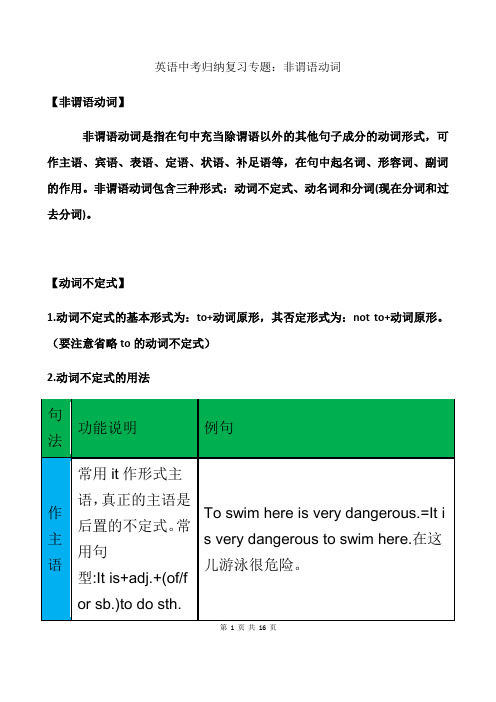
英语中考归纳复习专题:非谓语动词【非谓语动词】非谓语动词是指在句中充当除谓语以外的其他句子成分的动词形式,可作主语、宾语、表语、定语、状语、补足语等,在句中起名词、形容词、副词的作用。
非谓语动词包含三种形式:动词不定式、动名词和分词(现在分词和过去分词)。
【动词不定式】1.动词不定式的基本形式为:to+动词原形,其否定形式为:not to+动词原形。
(要注意省略to的动词不定式)2.动词不定式的用法第 1 页共16 页第 2 页共16 页巧记口诀:常见的只跟不定式作宾语的动词决定学会有希望(decide,learn,wish,hope,expect), 同意计划莫假装(agree,plan,pretend),胆敢拒绝会失败(dare,refuse,fail),第 3 页共16 页准备设法来帮忙(prepare,manage,help),提供请求负担起(offer,beg,afford),答应安排理应当(promise,arrange,be supposed),以上后跟不定式,劝君牢记永不忘。
【考点训练1】1.She volunteers there once a week ______ (help) kids learn _________ (read).2.If a Swiss(瑞士人) invites you _________ (meet) him or her at noon,then you’re expected ______ (be) there at noon.3.My brother always refuses _____ (let) me _____(watch) my favorite TV show.4.Lily plans ____ The Amazing Race(《极速前进》) tonight. ()A.watchB.watchesC.to watchD.watching5.Our teacher tells us ____ in the street because it’s too dangerous. ()A.not play soccerB.not to play soccerC.to not play soccerD.not playing soccer答案:to help to read to meet to be to let watch C B【动名词】第 4 页共16 页1.动名词由动词的-ing形式构成,其否定形式为:not+doing。
中考英语 非谓语 动词期末复习专题练习(word版 ...(1)
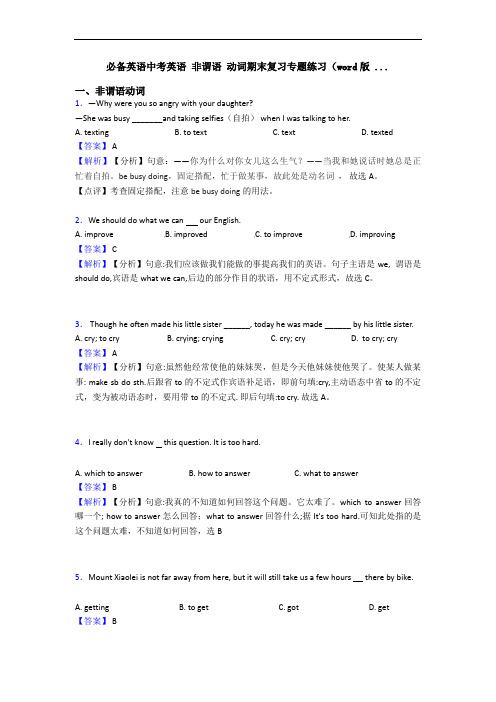
必备英语中考英语非谓语动词期末复习专题练习(word版 ...一、非谓语动词1.—Why were you so angry with your daughter?—She was busy _______and taking selfies(自拍) when I was talking to her.A. textingB. to textC. textD. texted【答案】 A【解析】【分析】句意:——你为什么对你女儿这么生气?——当我和她说话时她总是正忙着自拍。
be busy doing,固定搭配,忙于做某事,故此处是动名词,故选A。
【点评】考查固定搭配,注意be busy doing的用法。
2.We should do what we can our English.A. improveB. improvedC. to improveD. improving【答案】 C【解析】【分析】句意:我们应该做我们能做的事提高我们的英语。
句子主语是we, 谓语是should do,宾语是what we can,后边的部分作目的状语,用不定式形式,故选C。
3. Though he often made his little sister ______, today he was made ______ by his little sister.A. cry; to cryB. crying; cryingC. cry; cryD. to cry; cry【答案】 A【解析】【分析】句意:虽然他经常使他的妹妹哭,但是今天他妹妹使他哭了。
使某人做某事: make sb do sth.后跟省to的不定式作宾语补足语,即前句填:cry,主动语态中省to的不定式,变为被动语态时,要用带to的不定式. 即后句填:to cry. 故选A。
4.I really don't know this question. It is too hard.A. which to answerB. how to answerC. what to answer【答案】 B【解析】【分析】句意:我真的不知道如何回答这个问题。
九年级英语中考复习非谓语动词

考点二 动名词
动名词相当于名词、形容词。可作主语、宾语、表语和定语。
功能
例句
主语
Eating too much is bad for your health. 吃太多对你的健康有害处。
说明 谓语动词用单数
宾语
I like playing basketball very much. 我非常
变为被动语态:Jack is often heard to sing English songs.
第八页,共29页。
【巧学妙记】只能跟不定式作宾语的动词 决心学会有希望(decide, determine, learn, wish, hope),
同意计划莫假装(agree, plan, pretend),
只能作某些动词的宾语,一般 不作介词的宾语
She asked me to speak English. 她要求我说英语。
在make,let,see,hear, watch等使役动词后,不定式 省略to
Do you have anything to say? 你 不定式作定语,要放在所修饰
有要说的吗?
第二十一页,共29页。
3. (2012·自 贡 中 考 )—When are you going to have your hair _______? —This afternoon.
A. cut
B. to cut
C. cutting
【解析】选A。have sth. done“让……被做”。过去分词作宾语补足
答案:3. selling 4. named 5. playing
第十九页,共29页。
Ⅱ. 单项选择
1. (2012·安顺中考)—Do you know whether the man _______ by the door is Mr. Smith?
九年级英语总复习(十)非谓语动词(DOC)
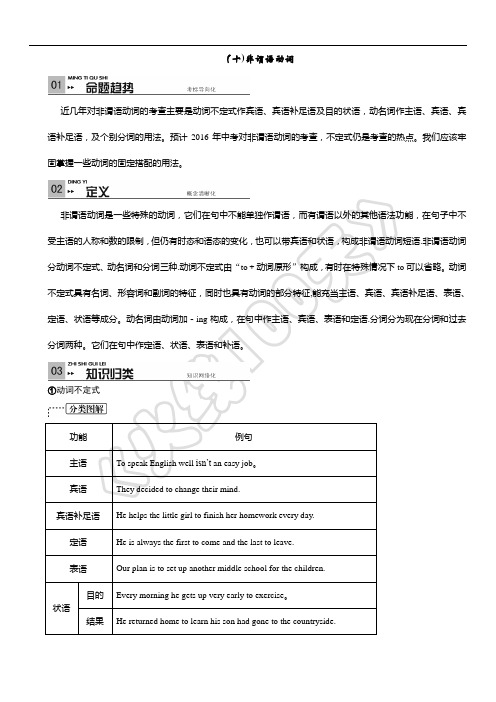
(十)非谓语动词近几年对非谓语动词的考查主要是动词不定式作宾语、宾语补足语及目的状语,动名词作主语、宾语、宾语补足语,及个别分词的用法。
预计2016年中考对非谓语动词的考查,不定式仍是考查的热点。
我们应该牢固掌握一些动词的固定搭配的用法。
非谓语动词是一些特殊的动词,它们在句中不能单独作谓语,而有谓语以外的其他语法功能,在句子中不受主语的人称和数的限制,但仍有时态和语态的变化,也可以带宾语和状语,构成非谓语动词短语.非谓语动词分动词不定式、动名词和分词三种.动词不定式由“to+动词原形”构成,有时在特殊情况下to可以省略。
动词不定式具有名词、形容词和副词的特征,同时也具有动词的部分特征,能充当主语、宾语、宾语补足语、表语、定语、状语等成分。
动名词由动词加-ing构成,在句中作主语、宾语、表语和定语.分词分为现在分词和过去分词两种。
它们在句中作定语、状语、表语和补语。
①动词不定式功能例句主语To speak English well isn’t an easy job。
宾语They decided to change their mind.宾语补足语He helps the little girl to finish her homework every day.定语He is always the first to come and the last to leave.表语Our plan is to set up another middle school for the children.目的Every morning he gets up very early to exercise。
状语结果He returned home to learn his son had gone to the countryside.1.不定式作宾语(1)一些谓语动词后只能用不定式作宾语,常见的这类词是表示命令、打算或希望的,如:would like,like,want,wish,hope,decide,plan,expect等。
(完整word)初中英语非谓语动词总复习加练习及答案
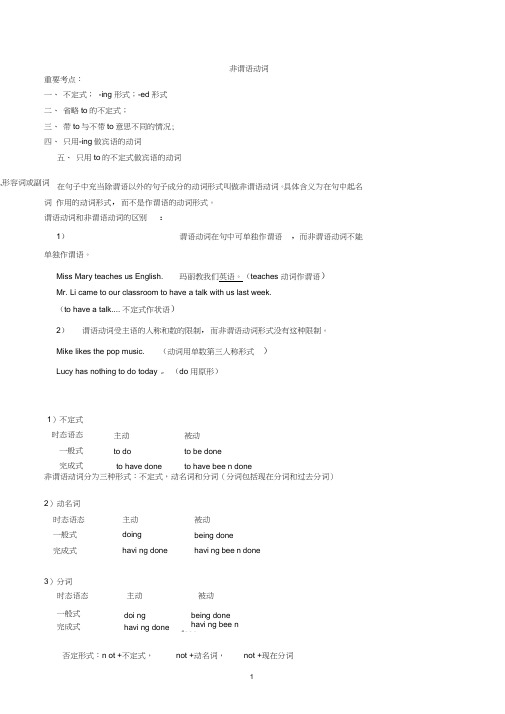
重要考点:一、 不定式; -ing 形式;-ed 形式 二、 省略to 的不定式;三、 带to 与不带to 意思不同的情况; 四、 只用-ing 做宾语的动词五、 只用to 的不定式做宾语的动词在句子中充当除谓语以外的句子成分的动词形式叫做非谓语动词。
具体含义为在句中起名词 作用的动词形式,而不是作谓语的动词形式。
谓语动词和非谓语动词的区别:1) 谓语动词在句中可单独作谓语,而非谓语动词不能单独作谓语。
Miss Mary teaches us English.玛丽教我们英语。
(teaches 动词作谓语)Mr. Li came to our classroom to have a talk with us last week. (to have a talk.... 不定式作状语) 2)谓语动词受主语的人称和数的限制,而非谓语动词形式没有这种限制。
Mike likes the pop music.(动词用单数第三人称形式)Lucy has nothing to do today 。
(do 用原形)非谓语动词分为三种形式:不定式,动名词和分词(分词包括现在分词和过去分词)2)动名词 时态语态 主动 一般式 doing 完成式havi ng done3)分词时态语态 主动 被动 一般式 doi ng being done 完成式havi ng donehavi ng bee n done非谓语动词否定形式:n ot +不定式,not +动名词,not +现在分词,形容词或副词1)不定式 时态语态 一般式完成式 主动 to doto have done 被动 to be doneto have bee n done被动 being done havi ng bee n done动词不定式、结构及特征:1、动词不定式的基本形式是“ to +动词原形”,有时可以不带to。
2、特点:动词不定式没有人称和数的变化,在句子中不能作谓语,但可以担任除谓语外的任何成分—语、表语、宾语、状语和宾语补足语,所以我们又称之为非谓语形式。
- 1、下载文档前请自行甄别文档内容的完整性,平台不提供额外的编辑、内容补充、找答案等附加服务。
- 2、"仅部分预览"的文档,不可在线预览部分如存在完整性等问题,可反馈申请退款(可完整预览的文档不适用该条件!)。
- 3、如文档侵犯您的权益,请联系客服反馈,我们会尽快为您处理(人工客服工作时间:9:00-18:30)。
2010-2011初三上学期英语期末复习——非谓语动词1根据句意,用所给动词的适当形式填空。
(非谓语动词专项练习)
1. Is it necessary ____________(learn) a foreign language?
2. He is good at _____________(swim).
3. Do you have anything ____________(say) for yourself?
4. It’s spring now. It’s time _____________(plant) trees.
5. Don’t keep me _______(wait) for a long time.
6. The policeman told the boys not ____________(play) in the street.
7. Her son is too young __________(dress) himself.
8. The ice _________(cover) with snow is dangerous to walk on.
9. China doesn’t want ___________(copy) the USA’s example.
10. Let’s __________(have) a rest, shall we?
11. The speaker spoke too quickly for us ____________(understand).
12. The book seems easy __________(read).
13. I asked him __________(show) me his new pen.
14. A __________(break) car is parked at the corner of the road.
15. Knives are used for ______________(cut) things.
16. What’s his _____________(give) name, do you know?
17. I really don’t know what __________(do) next.
18. I often hear people _________(say) “________(see) is ______(believe)”.
19. You’d better _________(try) this medicine.
20. They said they had nothing _________(worry) about.
21. Can you finish ___________(read) the book in three days?
22. I have been busy all these days. I really want __________(relax) myself.
23. The doctor was busy ____________(operate) on the boy at that time.
24. Mary opened the door for him _______(come) in.
25. ______(tell) you the truth, I dislike making friends with him.
26. His wish was ____________(become) a doctor.
27. Stop ___________(talk) and listen to me carefully.
28. Thank you very much for ____________(help) us.
29. Granny is very ill and she doesn’t feel like ___________(eat) anything.
30. Would you like __________(climb) the mountain with me?
31. The girl enjoys ___________(listen) to light music.
32. Do you remember ___________(buy) me a beautiful skirt on my 13th birthday?
33. Which of the following things would you like _________(own)?
34. We couldn’t help ________(laugh) after we heard the funny story.
35. What about _________(go) out for a walk?
36. The boy was too short ___________(reach) the toy on the desk.
37. I found a man __________(lock) the door when I passed by.
38. I was wrong _____________(speak) to her about it.
39. _________(be) honest, I j ust don’t like him.
40. Mr Fang promised __________(provide) some help to the village school.
【试题答案】
1. to learn
2. swimming
3. to say
4. to plant
5. waiting
6. to play
7. to dress
8. covered
9. to copy 10. have
11. to understand 12. to read 13. to show 14. broken 15. cutting 16. given 17. to do 18. say; seeing ; believing 19. try
20. to worry 21. reading 22. to relax 23. operating 24. come 25. Tell 26. to become 27. talking 28. helping 29. eating 30.to climb 31. listening 32. buying 33. to own 34. laughing 35. going 36. to reach 37. locking 38. to speak 39. To be 40. to provide。
